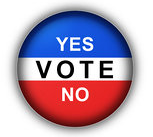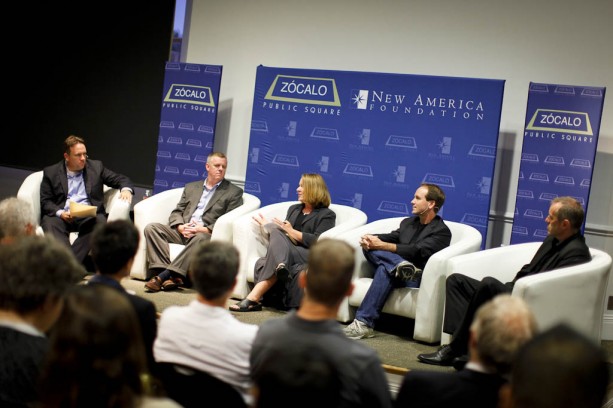Citizen Blog
Today, two big ballots in two different states should give us an idea of where Americans stand on the political spectrum. In Mississippi, voters will decide when life begins and when a person becomes a person. In Ohio, voters will decide whether or not to keep Governor Kasich’s union reform law.

The citizen-initiated referendum on Ohio Governor John Kasich’s public sector union law will be tested at the polls tomorrow across the state. Citizens utilizing their First Amendment petition rights could very well determine the fate of the governor’s political future:
A lot has happened in Missouri over the last few years regarding its citizen initiative process. The will of the voters was overturned by a vote in the Legislature, a campaign sprung up to change the law in order to protect citizen passed ballot initiatives, and now…a Republican state representative is proposing additional changes to the way Missouri handles ballot initiatives:
If you’re in the Chicago area tonight come check out the 35th Anniversary celebration for Taxpayers United of America. Our very own Paul Jacob will be a featured speaker at the event:
FOR IMMEDIATE RELEASE
November 2nd, 2011
Contact: Jim Tobin (773) 354-2076 | Christina Tobin (312) 320-4101
CHICAGO””Taxpayers United of America (TUA), one of the largest taxpayer organizations in the country and founded in 1976 by Jim Tobin, will hold its 35th anniversary celebration on Thursday, Nov. 3, 2011. The event will be at the University Club of Chicago, 76 E. Monroe St., Chicago, and will start at 6 pm.
Members of the media are invited. (The University Club requires jackets, ties optional, and no denim.)
Speakers include:
Colorado citizens hit the polls yesterday to decide whether or not to raise taxes:
It seems public employee pension reform is one of the hot topics so far this year. In Wisconsin, Governor Scott Walker his budget repair bill with significant pension reforms. The changes split the state and the law was passed amid protests outside the state capitol. Following passage of the bill, citizens weighed in at the ballot box against a handful of politicians around the state in citizen-initiated recall elections.
In Ohio, Governor John Kasich’s pension reform bill that passed earlier this year will face public scrutiny in a statewide referendum vote next week. This is the same vote we mentioned last week on the blog, the one presidential candidate Mitt Romney endorsed, then didn’t endorse, and then endorsed again.
Earlier this week Mitt Romney visited Ohio and declined to support Governor Kasich’s union reform law, but it seems he’s clarified his position after an uproar on right:
On November 8, Ohioans will head to the polls to vote on Issue 2, a referendum to repeal Governor John Kasich’s union reform bill that limits collective bargaining power for state public employee unions.
Much like the law passed in Wisconsin by Governor Scott Walker, Ohio’s collective bargaining law was met with stiff protest from unions who collected enough signatures to force a referendum vote.
The 100th Anniversary Celebration of California’s Initiative & Referendum held in Sacramento on October 10 was a great success. Citizens in Charge Foundation, our partner organization, was joined by over 100 Californians to commemorate the centennial and transpartisan dialogue ensued throughout the day-long forum and early evening reception hosted by The Consulate General of Switzerland in San Francisco.
Good news! A potential 2012 ballot measure in Montana would protect voter-passed initiatives from unilateral repeal and amendment by the State Legislature. This protection is essential in keeping the citizen initiative process effective as a tool to keep elected officials in check:
George Will’s recent column, “A republic, guaranteed,” generally scoffs at a lawsuit filed in federal court in Colorado attempting to overturn the state’s voter-initiated Taxpayer Bill of Rights amendment, which caps state spending. But while disagreeing with the goal of the lawsuit, Mr. Will seems to in part agree with those who filed it. At least when they argue in their legal brief that there is a “contest between direct democracy and representative democracy.”
On Monday, October 10, 2011 Citizens in Charge Foundation (our partner organization) will join with Californians from all over the state to celebrate the 100th Anniversary Celebration of California’s Initiative & Referendum Process. The event is free and open to the public, but RSVP to Amanda@CitizensInCharge.org is required for registration.
From BallotAccessNews.com: On September 16, the Ninth Circuit ruled 9-2 that cities may not criminalize the act of standing on a public sidewalk to solicit “employment, business, or contributions from an occupant of any motor vehicle.” The case is Comite de Jornaleros de Redondo Beach v City of Redondo Beach, 06-55750. Although this is not directly related to petitioning (because petitioners never expect anyone driving a car to pull over to the curb, get out of the car, and sign a petition), the decision illustrates the protection that the First Amendment gives to anyone who uses a public sidewalk for First Amendment activity.
 Californians’ initiative, referendum and recall process is as hot a topic for debate as ever. That’s apt, for this year marks the process’s 100th anniversary.
Californians’ initiative, referendum and recall process is as hot a topic for debate as ever. That’s apt, for this year marks the process’s 100th anniversary.
On October 10, 1911, Californians went to the polls to enact these democratic checks on government after Governor Hiram Johnson persuaded legislators to put them on the ballot. On October 10, 2011, I’ll be in Sacramento at an event sponsored by Citizens in Charge Foundation to celebrate the centennial.
Officials in Redmond, Washington are determined to have their state live up to its recent designation as a “battleground state” in the fight against red light cameras.
The city is refusing to send petitions on to King county officials despite a state law requiring them to do so. According to the mayor:
We’ve been advised by our attorney that the subject of this petition is not subject to initiative. Therefore, there’s no state law compelling us to do anything with the signatures.